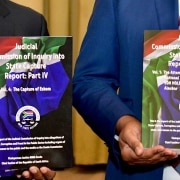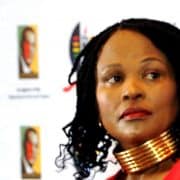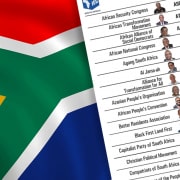|
Getting your Trinity Audio player ready...
|
By Thato Mahlangu
The North Gauteng High Court’s judgment which was handed down on Tuesday, 10 March 2020, saw Public Protector Advocate Busisiwe Mkhwebane’s findings and remedial actions being dismissed.
The findings and remedial actions, that were labeled as ‘confused’ by the court, had found President Cyril Ramaphosa to have had an improper relationship with the late CEO of African Global Operations (formerly known as Bosasa), Gavin Watson.
Part of the remedial actions would have required Ramaphosa to declare in Parliament who donated to the CR17 campaign.
Mkhwebane also found Ramaphosa to have received a R500 000 donation to the CR17 political funding campaign from the company (which was alleged to have been made to Ramaphosa’s son, Andile) during the 2019 national elections.
Mkhwebane’s findings also revealed that Ramaphosa had misled Parliament when asked about the donation, which culminated in a more in-depth investigation by the Public Protector’s office. In the report Mkhwebane claimed that there was some element of money-laundering in the political funding campaign. But the court found that not to be true.
The case was dismissed with costs.
Court’s decision welcomed
On 10 March 2020, National Assembly (NA) speaker Thandi Modise said she welcomes the court’s decision to set aside the remedial actions. Modise was the second applicant in the matter.
In the statement, Modise had said the remedial actions were founded on an erroneous comprehension of the Ethical Code of Conduct and Disclosure of Members’ Interests and its scope of application and, thus, made its implementation impractical.
“The court agreed that the speaker did not have the powers to instruct the president to disclose in the Register of Members’ Interests the donations received by CR17 campaign as the code primarily applied to serving Members of Parliament. President Ramaphosa ceased to be a member when he was elected president on February 2018,” read the statement.
Parliament’s spokesperson Moloto Mothapo said the court also found that the public protector’s directive that Parliament implements her observations, including possible amendment of the rules dealing with questions and answers in the House, was inappropriate and an “unwarranted encroachment on the speaker’s discretionary powers”.
CW has called for Mkhwebane’s removal
Mkhwebane’s failure to fulfil her role as an independent public protector has made Corruption Watch (CW) question why she is still in the office.
Some of the cases Mkhwebane has dealt with since she was appointed as the public protector in October 2016, following her predecessot Advocate Thuli Madonsela’s end of tenure, have brought the office into disrepute.
In a statement released on 8 March 2018 by CW, we stated that the organisation had been prepared to give Mkhwebane the opportunity to settle into this difficult position.
However, after a series of appalling reports emanating from her office (which include the latest court judgment relating to the CR17 campaign), CW took a different stance.
“CW is increasingly persuaded that she should do the honourable thing and resign, or be removed from office through the required parliamentary processes,” read the statement.
CW’s executive director David Lewis said the public protector has demonstrated an extraordinary level of professional incompetence and, of greater concern, a lack of integrity.
“She has, in the course of her work, not only incurred the displeasure of the public but has suffered the extraordinary rebuke of having a personal costs order imposed on her by the court. She is clearly not fit to occupy this high office and must go or be removed.”
Parliament’s process in having her removed
The process of removing Mkhwebane from office is currently underway, says Parliament.
Mothapo said in a press statement that Modise had asked political parties to nominate people who will serve on a panel of experts which will be formed to facilitate the motion brought forward that would see Mkhwebane removed from office.
The process (which will be handled by the panel after the NA rules were passed last year) will be based on the amendments (to the rules) being made when office bearers of Chapter 9 institutions are removed from office.
Parliament said on 26 November 2019, that the existing NA rules and those reflected on section 194 of the Constitution have set broad parameters for the process of removing office bearers or commissioners in these institutions.
“For example, section 194 of the Constitution provides for removal only on:
- the ground of misconduct, incapacity or incompetence;
- a finding to that effect by a committee of the National Assembly;
- the adoption by the Assembly of a resolution calling for the person’s removal from office.”
The new draft rules explain what would constitute the grounds of misconduct, incapacity or incompetence:
- ‘misconduct’ means the intentional or gross negligent failure to meet the standard of behaviour or conduct expected of a holder of a public office;
- ‘incapacity’ includes a permanent or temporary condition that impairs a holder of public office’s ability to perform his or her work and any legal impediment to employment;
- ‘incompetence’ in relation to a holder of public office, includes demonstrated and sustained lack of knowledge to carry out and ability to perform or skill to perform his or her duties effectively and efficiently.
Parliament said in a statement the new draft rules also provide for any member of the NA to initiate, through a substantive motion, proceedings for a section 194 inquiry.
“The speaker must refer the motion and any supporting documents for a preliminary assessment to an independent panel, within 30 days of its appointment the panel must conduct and finalise a preliminary assessment of the motion proposing a section 194 inquiry and make a recommendation to the speaker. The speaker must also, without delay, inform the assembly and the President of this referral.”
According to Mothapo, the speaker will also be guided by recommendations made by the panel before making a decision, which includes referring the matter to a special section 194 committee for formal inquiry.
Mothapo said Mkhwebane had filed court papers with the hopes of having Modise interdicted from going ahead with the process.
“The papers seek to challenge the constitutionality of the Rules of the NA regarding the removal of office bearers of Chapter 9 State Institutions Supporting Democracy. The speaker opposed the application in defence of Parliament’s powers, as provided for in the Constitution. The Constitution states that these institutions are accountable to the NA,” according to Mothapo.








